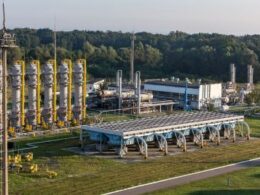Hungarian Foreign Minister Péter Szijjártó has accused Ukraine of placing the European Union in a challenging economic position by halting the transit of Russian gas.
Ukraine ceased transporting Russian natural gas through its territory on 1 January 2025, citing "national security interests" as the primary reason. The decision came after Ukraine opted not to renew a five-year transit agreement with Gazprom.
The Hungarian foreign minister says that "even the most fanatic Brussels elites" cannot deny that the EU's competitiveness has "deteriorated sharply" recently.
He claimed that one of the main reasons is that "gas prices in Europe have become much higher than those of our competitors."
"The rise in European natural gas prices was mainly caused by measures that have artificially reduced its availability, such as eliminating certain natural gas sources due to sanctions or policies, as well as blocking certain transportation routes," Szijjártó stated on social media.
At the same time, he notes that Hungary has diversified its gas supply sources, so the increase in energy prices in Europe will not significantly impact the country.
He accused Ukraine of causing a recent price increase by halting Russian natural gas transit to Central Europe.
"Since the suspension of the Ukrainian transit route became final in mid-December, the price of natural gas on the European market has risen by 20%. Thus, while Ukraine is striving to join the EU as a candidate, its latest decision has once again placed the European economy in a difficult position, particularly affecting Central Europe," he wrote.
The Hungarian foreign minister states that he met with his Slovak counterpart, Juraj Blanár, to "analyze the situation" following the cessation of Russian gas transit.
"We agreed that both sides must respect the Association Agreement between the EU and Ukraine, and this agreement also includes provisions for maintaining energy transport routes," Szijjártó added.
Meanwhile, as of 6 January, the European Commission reported no sharp increases in gas prices in the EU following Ukraine's decision to stop the transit of Russian gas to the bloc, European Pravda reports.
Read more:
- “Historic event”: Ukraine halts Russian gas flow to Europe
- Bulgaria promises aid to Moldova after Russian gas supply halt
- Reality on the ground dictates Ukraine to cede some territory, claims Slovak defense minister
- Poland stands ready for Ukraine power backup if Slovakia cuts supply, Bloomberg sources say





